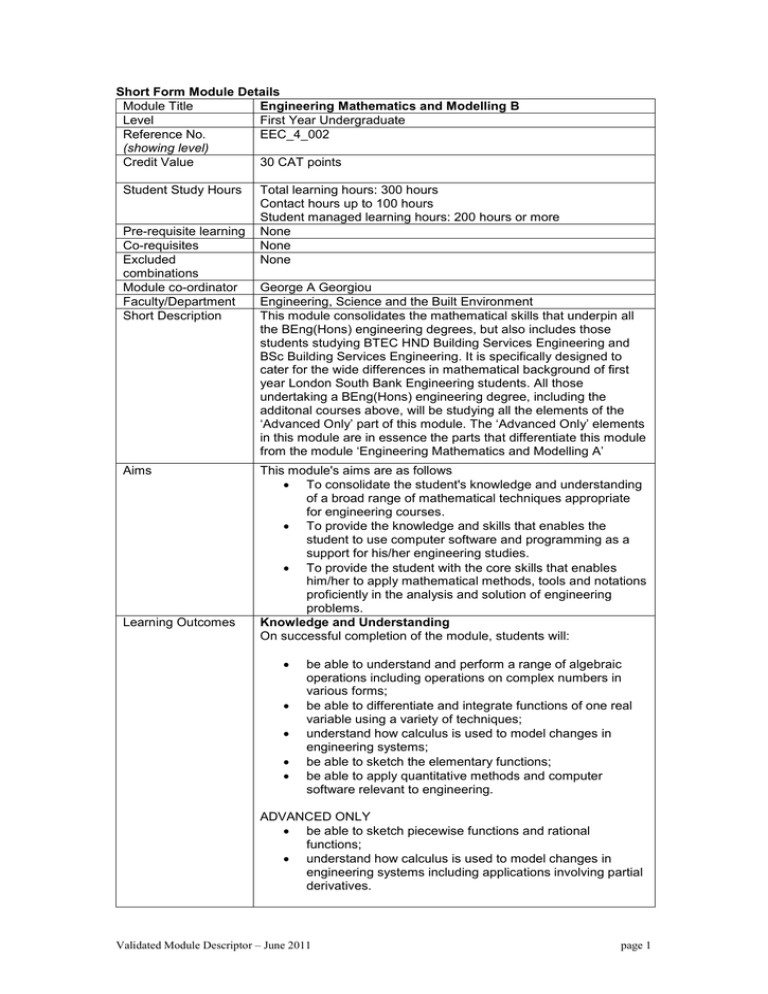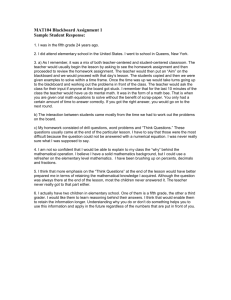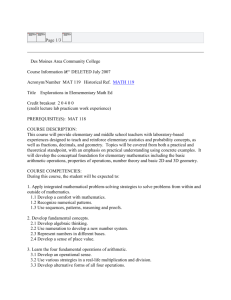
Short Form Module Details
Engineering Mathematics and Modelling B
Module Title
Level
First Year Undergraduate
Reference No.
EEC_4_002
(showing level)
Credit Value
30 CAT points
Student Study Hours
Pre-requisite learning
Co-requisites
Excluded
combinations
Module co-ordinator
Faculty/Department
Short Description
Aims
Learning Outcomes
Total learning hours: 300 hours
Contact hours up to 100 hours
Student managed learning hours: 200 hours or more
None
None
None
George A Georgiou
Engineering, Science and the Built Environment
This module consolidates the mathematical skills that underpin all
the BEng(Hons) engineering degrees, but also includes those
students studying BTEC HND Building Services Engineering and
BSc Building Services Engineering. It is specifically designed to
cater for the wide differences in mathematical background of first
year London South Bank Engineering students. All those
undertaking a BEng(Hons) engineering degree, including the
additonal courses above, will be studying all the elements of the
‘Advanced Only’ part of this module. The ‘Advanced Only’ elements
in this module are in essence the parts that differentiate this module
from the module ‘Engineering Mathematics and Modelling A’
This module's aims are as follows
To consolidate the student's knowledge and understanding
of a broad range of mathematical techniques appropriate
for engineering courses.
To provide the knowledge and skills that enables the
student to use computer software and programming as a
support for his/her engineering studies.
To provide the student with the core skills that enables
him/her to apply mathematical methods, tools and notations
proficiently in the analysis and solution of engineering
problems.
Knowledge and Understanding
On successful completion of the module, students will:
be able to understand and perform a range of algebraic
operations including operations on complex numbers in
various forms;
be able to differentiate and integrate functions of one real
variable using a variety of techniques;
understand how calculus is used to model changes in
engineering systems;
be able to sketch the elementary functions;
be able to apply quantitative methods and computer
software relevant to engineering.
ADVANCED ONLY
be able to sketch piecewise functions and rational
functions;
understand how calculus is used to model changes in
engineering systems including applications involving partial
derivatives.
Validated Module Descriptor – June 2011
page 1
Intellectual Skills
On successful completion of the module, students will:
understand the real number line and the complex plane;
be able to structure and decompose mathematical
problems by means of a computer program;
engage in technical discussion in a multi-cultural
environment;
gain experience in communicating mathematics clearly and
succinctly;
ADVANCED ONLY
be able to sketch functions using analysis.
Practical Skills
On successful completion of the module, students will be able to
solve engineering problems using vector and matrix
algebra;
apply statistics and calculus in engineering problems;
use mathematical software such as MATLAB and
MATHCAD to plot functions and solve equations
debug faulty program designs.
ADVANCED ONLY
use software to model and analyse engineering problems.
Transferable Skills
On successful completion of the module, students will be able to
use a logbook as an effective learning aid;
understand the need to “learn by doing” and to schedule
their time accordingly;
recognise familiar patterns in unfamiliar pictures;
write computer programmes that reduce the time and
tedium of manual calculation;
use sketches, diagrams and software as an aid to
understanding complex problems;
ADVANCED ONLY
classify problems and choose an appropriate solution
method;
transfer ideas and methods from one situation to a different
situation.
Employability
Teaching and
learning pattern
Indicative content
This is a Core Subject for all BEng(Hons), BTEC HND Building
Services and BSc Building Services engineering students, and as
such is a necessary module for continuing into the second year and
enhancing the opportunity for work experience and eventual
employment
The course will be composed of lectures and tutorials, which are
complemented by a comprehensive set of accompanying notes,
worked solutions as well as mathematical aids (e.g. revision cards,
video footage of worked examples) to help the student maximise
their capacity to learn and do mathematics
Overview of the Main Content
Revision of elementary algebra
he module will provide for some revision of elementary algebra, for
Validated Module Descriptor – June 2011
page 2
example indices rules, logarithms, transposition of formulae,
factorisation, surds, solving simultaneous equations.
Differential and Integral Calculus and Applications
Differentiation of elementary functions.
Differentiation of products and composite functions
Sketching the elementary functions
Definite and indefinite integrals:
Integration of elementary functions
Application to areas, means, variances and various
engineering problems
Maclaurin series
ADVANCED ONLY:
Limits, continuity, and piecewise functions.
Differentiation of implicit and parametric functions.
Partial differentiation
Further sketching of functions using properties of
transformations and using calculus (rational functions and
piecewise functions).
Modulus, odd and even functions, inverse function
Taylor series
Integration by change of variable, partial fractions, by parts
and by substitution
Solution of first order differential equations by separation of
variables
Complex Numbers:
Graphical representation: Cartesian, polar and exponential
form.
Elementary operations: Addition, subtraction, multiplication,
division.
ADVANCED ONLY:
De'Moivre's theorem.
Power, roots and logarithms
Applications of complex numbers: Loci
Introduction to Linear Algebra
Scalars and vectors
Vectors addition, subtraction
Dot product
Matrix addition and multiplication
Inverse and determinant of a matrix (2-D)
ADVANCED ONLY:
Vector cross product
Inverse and determinant of a matrix (3-D)
Handling Data:
Statistics:
Data averages and data variation
Elementary probability
ADVANCED ONLY:
Probability density function and distributions.
Validated Module Descriptor – June 2011
page 3
Computer software
Introduction to analytical software packages to handle
engineering problems.
Solving equations using software
Plotting functions, plotting data, statistics and applications
Symbolic algebra.
Arrays and Strings. Data Types, script files. Conditional
Loops.
Program Design
Problem solving using structured design and structured
programming.
Top-down design, functional decomposition, modular
programming.
Use of flow charts within consistent software design
methodology.
Assessment
Elements &
weightings
This module shall be assessed as follows:
Indicative Sources
(Reading lists)
CORE:
50% end of year examination.
50% continual assessment. This could include a phase test,
online test, and /or assignment.
1. Mathematics for Engineers, A Modern Interactive Approach: A
Croft and R Davison, (Pearson, Prentice Hall, 3rd Edition, 2008)
REFERENCE:
1. Foundation Mathematics: A Croft and R Davison, (Prentice
Hall,5th Edition, 2010)
2. Engineering Mathematics: Programmes and Problems: K. A
Stroud, (Basingstoke : Macmillan, 1995)
3. Further Engineering Mathematics: K. A Stroud, (Macmillan
Education, 1990)
4. Core Maths for Advanced Level: L Bostock and S Chandler,
(Stanley Thornes, 2000)
5. Further Pure Mathematics: L Bostock and S Chandler, (Thornes
1982)
Validated Module Descriptor – June 2011
page 4






